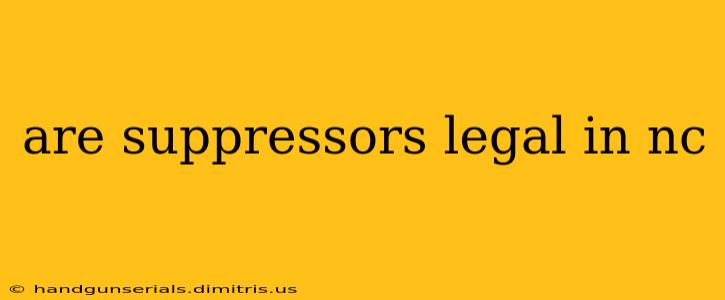The legality of firearm suppressors, often called silencers, in North Carolina can be confusing. This guide aims to clarify the current laws and regulations surrounding their ownership, possession, and use within the state. It's crucial to understand that this information is for educational purposes only and does not constitute legal advice. Always consult with a legal professional or relevant authorities for definitive answers pertaining to your specific circumstances.
North Carolina Suppressor Laws: The Basics
North Carolina law allows for the possession and use of firearm suppressors, but with specific requirements and restrictions. Unlike some states with outright bans, North Carolina treats suppressors similarly to firearms, requiring registration and adherence to federal regulations.
Key Legal Aspects:
-
Federal Regulations: The primary governing body is the Bureau of Alcohol, Tobacco, Firearms and Explosives (ATF). Federal law requires suppressors to be registered with the ATF through a licensed dealer. This is a crucial step in legal ownership. Failure to register a suppressor is a serious federal offense.
-
State Permits: North Carolina doesn't have a separate state permit specifically for suppressors. However, you'll need to comply with all state and federal laws regarding firearm ownership and licensing, which includes background checks and adherence to any relevant waiting periods.
-
Purchase and Transfer: Suppressors must be purchased through a licensed firearms dealer who will conduct the necessary background check and facilitate the ATF registration process. Private transfers are generally permitted but require adherence to stringent ATF regulations and often involve the involvement of a licensed dealer.
-
Use Restrictions: While legal to possess, using a suppressor during the commission of a crime will result in severe penalties, both at the state and federal levels. Additionally, some localities may have further restrictions on their use, so it's important to be aware of any municipal ordinances.
-
Transportation: Transporting a suppressor requires adherence to both state and federal laws concerning firearm transport. This generally involves ensuring the suppressor is unloaded, properly secured, and transported according to established regulations.
Understanding the Differences: Suppressors vs. Silencers
It's important to clarify the terminology. While commonly referred to as "silencers," the more accurate term is "suppressor." These devices don't silence a firearm completely, but rather significantly reduce the sound of gunfire.
Seeking Legal Counsel
This information is a general overview and should not be considered a substitute for legal advice. North Carolina's laws are complex, and specific circumstances can significantly impact the legality of suppressor ownership and use. Consulting a qualified attorney specializing in firearms law is highly recommended before purchasing or possessing a suppressor in North Carolina.
Staying Informed
Laws can change, so staying updated on any amendments or new legislation affecting firearm suppressors in North Carolina is essential for responsible ownership. Regularly check the North Carolina General Assembly website and the ATF website for the most current information.
Disclaimer: This article is intended for informational purposes only and does not constitute legal advice. Consult with legal counsel for advice tailored to your specific situation. The author and publisher assume no liability for actions taken based on the information provided herein.

